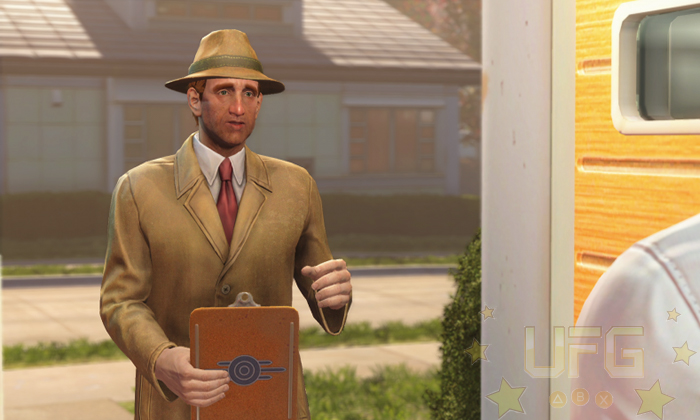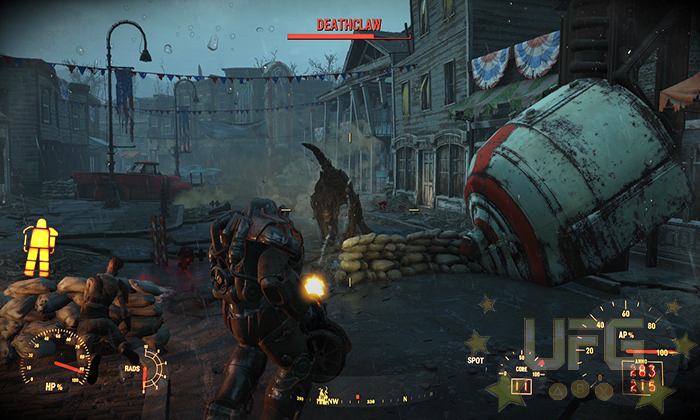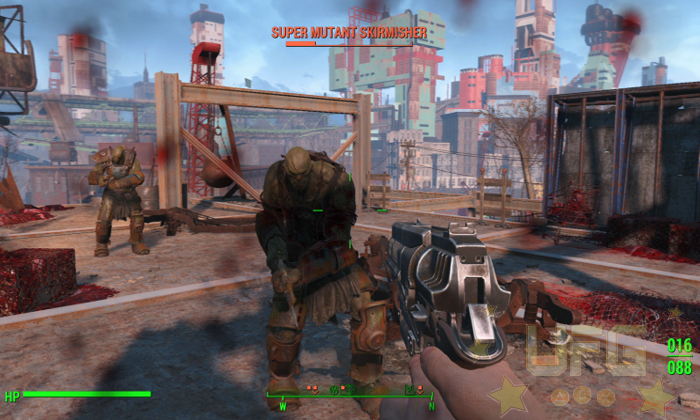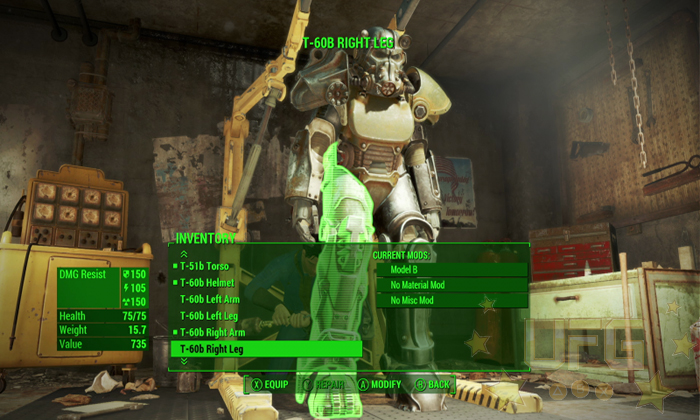Fallout 4
Bethesda Games Studios is in a very peculiar place right now. Known for their work on the Elder Scrolls and Fallout series, people have come to expect the best from them. While that’s certainly a good thing, being pressured to deliver a proper follow up to Fallout 3 has got to be intimidating. Don’t get me wrong, Fallout New Vegas wasn’t a bad game. It also wasn’t developed by Bethesda. With Fallout 4’s announcement comes the expectation to experience something awesome; the hype train has sped through all of the logical stops on its route to launch, which could set its passengers up for disappointment…
Fallout 4 opens to a suburban neighborhood in Boston, Massachusetts on October 23, 2077. The protagonist, in my case a male character, is enjoying some quality time with his wife and newborn son after returning home from an ongoing war. It isn’t long into their day before they’re greeted by a man representing an underground facility called Vault 111. Apparently, they were chosen to be potential residents of this vault in the unlikely event that the war turned nuclear. Moments later a news reporter on their television shares the unthinkable; bombs are being dropped all over the US, resulting in widespread destruction. Seconds later a siren goes off, alerting the town that it is time to seek shelter. Our family of three pushes their way through the crowd held at the gates of Vault 111. With their names on the list, they make it to the vault’s entrance right before a nuke hits their town.
Of course, this being Fallout and all, tragic events unfold within the “safe” walls of Vault 111. I won’t go into what exactly happens, only to say that you’ll emerge from this underground dwelling two hundred years after the bombs dropped. Life as it was depicted during the opening moments has ceased to exist. In its place is a commonwealth that’s engorged with radiation, lawlessness and death. Fun times!
It’s hard to look at Fallout 4 and not see its predecessors. Players will traverse the commonwealth as they seek out those that wronged them. Crossing paths with interesting individuals gives way to odd jobs in exchange for information. The leader of a settlement that’s currently under siege by raiders will share anything he can after being liberated. Once the job is done (either using violence or diplomacy), the journey beings again. As players go from place to place, they’ll start to develop a reputation. Folks will remember their deeds whether good or bad and react accordingly. The same thing goes for the overall narrative; major decisions that’ll eventually affect those living in the commonwealth will be laid at the protagonist’s feet. Experience points will be gained and different perks will be upgraded to unlock new abilities. Most of which will make it easier to deal with the many ghouls, giant rodents, and super-mutants polluting the wastelands. Basically, it’s more of what we’ve come to expect from this series.
This isn’t necessarily a bad thing mind you. A franchise can continue to deliver worthy experiences without overhauling its established gaming “language” with each instalment – if it isn’t broken and so on. That doesn’t mean that Bethesda didn’t make some significant gameplay changes though. For one, the gunplay has vastly improved since New Vegas. I’m not sure if I was given more control over my crosshairs or if there’s some advanced form of aim assist happening behind the scenes, but it has never been easier to hit a moving target. It’s now possible to run and gun without leaning heavily on the Vault-Tec Assisted Targeting System (V.A.T.S). Interesting enough, the enemies I encountered seemed way more enthusiastic then I remember. The ghouls in particular proved more threatening as they’d quickly swarm like crazy brain fried locusts, forcing me to make haste or suffer a loading screen (aka death).
When I did use V.A.T.S, I noticed that time didn’t freeze as it had in the past. Instead, the world would slow to a crawl, still giving me time to pick my shots but without completely pausing the action. This means that my hit percentages would change as foes moved in and out of range or ducked behind cover. In an attempt to offer balance, the system allows you to specify critical attacks. By filling up a meter and pressing a button as the shots or swings are in motion, I could land a devastating blow at the most opportune time. These changes actually made using V.A.T.S more enjoyable as I had to be a bit more strategic with how I utilized the system. Now, a well-placed shot successfully hits the target as a result of my skill, as opposed to just the role playing numbers regulating my aim.
The changes made to the combat certainly livens things up. What caused me to play into the wee hours of the morning though was the new crafting system. The world of Fallout is one full of junk. And though some of it was useful, most of it was stuff you sold to people who longed for days of old. That’s the only reason pre-war cash was considered valuable when the economy ran on bottle caps. In Fallout 4 though, everything you pick up is as valuable as clean water. Gun mods, armor upgrades, radio towers used to alert travelers of your newly made settlement – all of these and more can be made with the random odds and ends found scattered about.
The genius behind this system is how the game breaks down items into their base components. Say you’re looking to upgrade your laser pistol with a new frame and one of the needed materials are screws. Anything that has screws, from a toy truck to a desk fan, can be used for the frame. You aren’t locked into using one set of items to create what you need. Not only that, but you can tag what you need and the game will alert you to which pieces of junk has what you’re looking for before even picking them up. Then there’s the ability to create new settlements in certain areas of the map. In these places you can build houses, farms, crafting stations, stores, watch towers, even a freaking teleporter! You can also scrap anything that isn’t a permanent fixture (so you don’t break the game) within these areas for needed materials. A tree lying across the road and a dilapidated house, once scrapped will provide you with wood and steel respectively. Honestly, it’s maddening how addictive crafting becomes when all of these elements become available to you. Just…stay away from it if your goal is to actually see the story through.
Though Fallout 4 was most definitely a blast to play, I did have some reservations when it came to how the story played out during the later parts of the game. Things started out great, providing a real sense of urgency; even though there wasn’t much time spent with my character’s family, I was eager to find out what really happened to them down in the vault. As the mystery continued to unravel I learned about shadowy organizations, people being taken from their homes at night, and androids, called Synths, that posed as humans – there was some exciting stuff here! There were even ties to Fallout 3 that diehard fans are sure to love. The problem for me came late in the game after a major plot development. New information is given that causes the main character to rethink his or her position, which in turn could change who you ultimately align yourself with. The thing is, during this revealing conversation, I’m never given the chance to ask logical questions. Questions that would help me determine whose side I should be on.
You are somewhat pressured into taking a certain side on the premise of missing parts of the story. Like if I choose not to do a particular quest, I might not find out why certain actions concerning my family were carried out. Beyond that, you only have outlining themes to go on; side A wants to save the world by any means necessary while side B wants to save the world by wiping out side A. There’s just not enough information given to help me make a choice between betraying or remaining faithful to the people that’s been helping me throughout my entire journey. Now to be fair, the player has a heavy hand in how things play out. It could be that my choices up till that point prevented me from learning more about the situation at hand. That said, it felt like the developers wanted to make this key decision a tough one (rightfully so) but instead of creating a real conflict, opted to leave out information that would better inform the player until after they chose a side; and in some cases you’d still miss vital information.
It’s hard not to talk about everything that’s…well, worth talking about. I could go into great detail about how the side quests are spread out across the map in such a way that you’ll never have to walk far to get to a story quest (thanks to fast traveling). Or I could describe the incredible attention to detail – I especially liked the UI changes that took place whenever you entered a power armor suit – which resulted in beautifully grim environments. I can spend days on the new menaces that populate the world and the morally ambiguous NPCs you’ll come across. Ultimately, what you should know is that I immensely enjoyed my time in the commonwealth. Even with the vague story elements here and there, you’ll be hard pressed to find a more satisfying action RPG currently on the market (sans The Witcher 3 of course)!
Editor’s note: We found the Xbox One and PS4 versions to be too similar to warrant separate reviews; we did noticed frame rate issues with the PS4 version but they only happened during large firefights between factions. We only played the Xbox One version to completion though, so there may have been things that we missed. We’ll update this section with our impressions of the PC version shortly.
Update/PC Difference: As with most games of this ilk, the PC version had its fair share of bugs; it even crashed a few times early on. That said, it’s much better than triple A titles recently released on PC – since receiving an update a day or so ago, the game has ran near flawlessly. Visually, this version looks better than what’s seen on consoles but some of the lingering glitches keep it from towering over them. Basically, there’s no need to change our score as we’d recommend getting Fallout 4 on the platform of your choice!
Gameplay:
9
The revamped action mechanics and new crafting system makes Fallout 4 a fun game. The tried and true formula helps as well. The story suffers towards the end but it isn’t enough to ruin the entire experience.
Graphics:
8
Details will slowly bleed in as you move closer to objects in the environment. Most of it you won’t notice though because the frame rate is so smooth. Character facial features are hit and miss though as close ups showed dead eyes and poor mouth synching.
Sound:
10
The gun/laser fire, voice work and music sounded great.
Replay Value:
10
It’s really hard to put down. After completing the campaign, I immediately started up a past save and took a different route. And the crafting…my God, the crafting…
Final Score:
9.3




